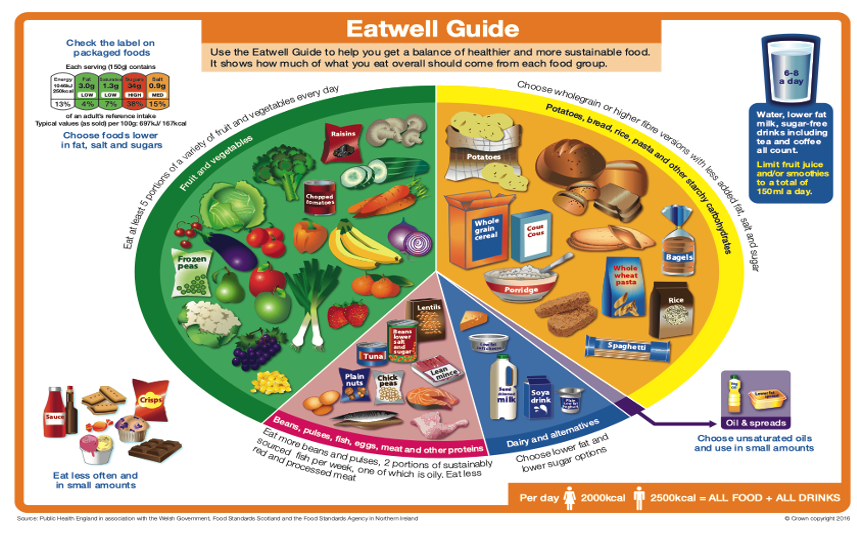Education on nutrition is a chance to get children comfortable with understanding where produce comes from, how to prepare and cook foods. Also, education allows children to develop a love for food and develop social skills which are beneficial for good health and wellbeing in later life. It is important to remember that rejection of food is normal at this age, as children gain independence, and additional social influences can impact food choices. It is important not to restrict, but to educate about including all food in a varied and balanced healthy diet.
All children over 5 years of age should follow a diet based on the Eatwell Guide. This provides an evidence-based visual to understand what a balanced and varied diet should look like.
The Eatwell Guide (Source: Public Health England, 2016).

The important nutrients to focus on include:
- Carbohydrates: focus on potatoes, bread, rice, pasta, couscous, cereal and starchy vegetables.Choose wholegrain or wholemeal varieties where possible.
- Provides energy for the body.
- Dietary fibre: high fibre breakfast cereals, whole grain bread, wholewheat pasta, beans, pulses, fruits and vegetables.
- Helps keep gut and tummies happy and healthy
- Protein: lean meat, fish, dairy, eggs, pulses, beans and legumes.
- Needed for growth and maintenance of health, as well as providing energy for everyday activities.
- Fat: aim for unsaturated fat from avocado, plant/vegetable oils, nut oils, lower fat spreads, olive oil, fish, nuts and seeds.
- Maintains structure of cells, carries and supports absorption of fat-soluble vitamin
- Saturated fat: fatty meats, biscuits, cakes, crisps.
- Should be consumed less regularly.
- Water: Hydration is important.
- Aim for consistent sips throughout the day. If you wait until you are thirsty then you are already dehydrated. No-added sugar squash, and small glasses of fruit juice also count.
- Omega 3:
- Important for cell structures, especially for brain cells.
- Sardines, mackerel, anchovies, salmon, herring (SMASH fish), muscles, oysters, chia seeds, walnuts, hemp seeds, vegetable oils, soya and soya products, flaxseeds and linseeds and supplements.
- Omega 6: vegetable oils, avocado, sunflower seeds, pumpkin seeds, nut butters.
- Essential in small amounts. Used to support our cell shapes and structure.
- Calcium: dairy, tofu, soya beans, green leafy vegetables, fortified cereal, flour, bread, fish with bones and soya drinks.
- Important for healthy bones and teeth, and maintains normal functioning of nerves, muscles and blood clottings.
- Iron: lean meat, liver, wholegrain cereals, pulses, beans, nuts, dark green leafy vegetables, fortified breakfast cereals, and dried fruit.
- Helps to make red blood cells and supports healthy immune system and brain function.
- Zinc: meat, fish, wholegrain cereals, peas, beans, lentils, tofu, nuts, cheese and eggs.
- Important for immune function, and growth and development.
- Vitamin A: milk, yogurt, cheese, eggs, fortified fat spreads, red vegetables and green leafy vegetables.
- Helps our immune system support vision and keeps the skin healthy.
- B vitamins: milk, eggs, fresh fruit and vegetables, potatoes, whole grain breads, fortified cereals, beef, pork, chicken, fish, porridge, yeast, and nuts.
- Helps our bodies access energy essential for growth and development.
- Vitamin C: vegetables, potatoes and fruits.
- Protects cells from damage, supports our immune system and nervous system function normally and forms collagen which is important for bones, gums, teeth and skin.
- Vitamin D: Sunshine, eggs, mushrooms, oily fish, fortified spreads and soya drinks.
- Helps the body to absorb calcium to keep bones strong, support muscles to function normally, and helps the immune system to work correctly.
Vegan/ Vegetarians
- Substitutes for meat: soya, mycoprotein (quorn), seitan, and pea protein.
- Energy: nutrient dense foods such as tofu, bananas, seeds, nut butters, vegan spreads and vegetable oils.
- Protein: (2-3 portions a day): pulses (lentils, chickpeas, hummus, garden peas, beans, baked beans), grains (spelt, oats. Quinoa and rice), nuts (brazil nuts, almonds, walnuts, cashews, peanuts), seeds (hemp, pumpkin, ground linseed, chia), soya, dairy alternatives, cheese, nuts and milk.
- Iron: wholegrain cereals, dark leafy green vegetables, lentils, beans, dried apricots, figs, fortified bread, quinoa, tempeh, lentils, tofu, peas, spinach, cashews, nutritional yeast, mushrooms and chickpeas.
- Calcium: soya milk, cheese, milk, tofu, edamame, broccoli, parsley, pumpkin, sweet potato, spinach, white beans, soya beans and dairy alternatives.
- Vitamin b12: milk, eggs, fortified foods and supplements.
- Omega 3: muscles, oysters and algae based supplements.
Make food fun!
- Encourage children to choose ingredients from the food shop that they want to cook with.
- Get the children involved with the chopping and cooking of the food, to provide exposure to new ingredients.
- Try a new recipe every week so often that the children have chosen that sounds interesting for them.
- If you have the space (a sunny windowsill is enough!). Getting children involved with growing herbs is a fun way to get them interested in food and try new flavours. You could start with cress or basil.
Things to remember
- Keeping children active (60 minutes of moderately strenuous activities a day) is important to help children regulate hunger.
- Aim for a varied and balanced diet to hit a range of nutrients.
- Children need adequate calories for energy and growth.
- Breakfast is important to regulate blood sugars and keep energy levels high for school.
- Have regular meals and snacks to get all the foods and nutrients children need.
- Snacks are important to gain additional energy and nutrients. Choosing these wisely is important. Foods high in fat, salt and sugar should be limited, instead offer fruit and vegetable based snacks, lean meats, fish, and plain crackers or popcorn, with plenty of water.
Christchurch Food Festival Education Trust: Charity Number 1127292
Bournemouth University: MSc Nutrition and Behaviour: Francesca
